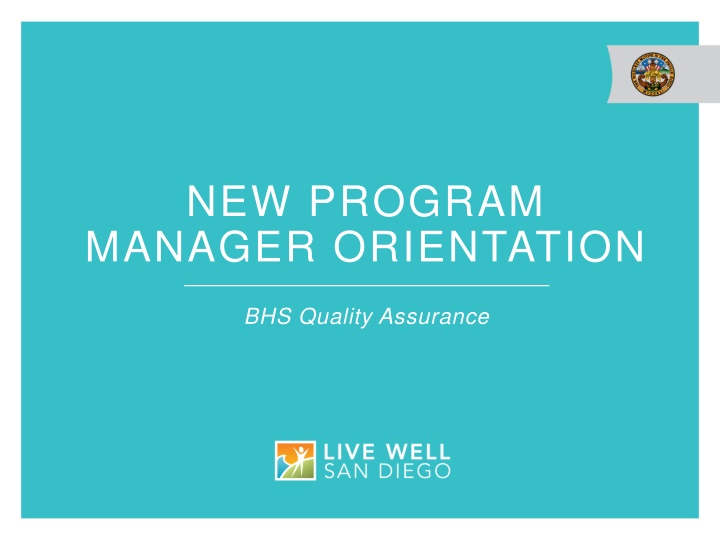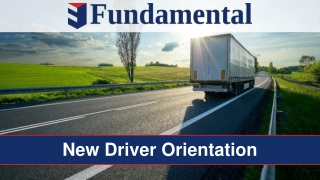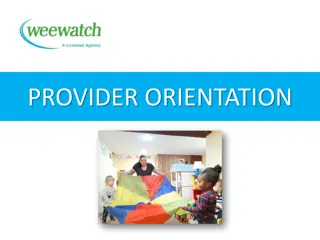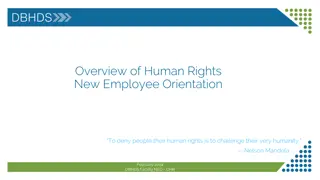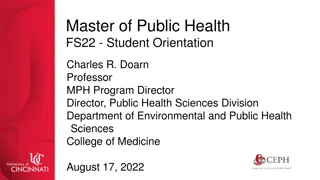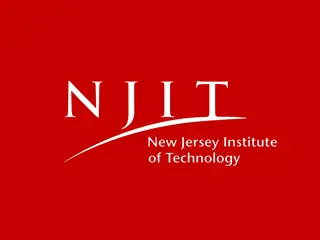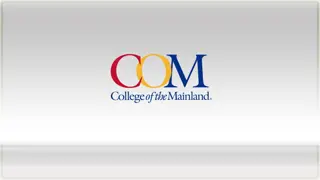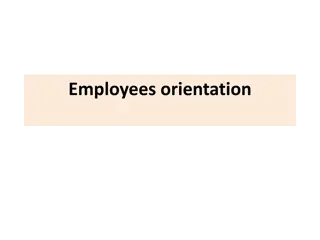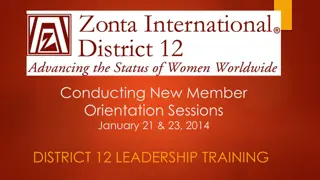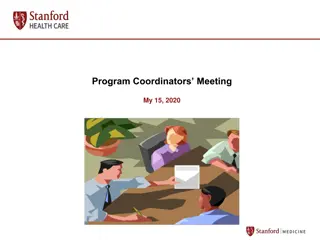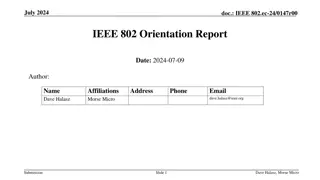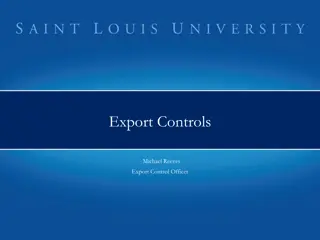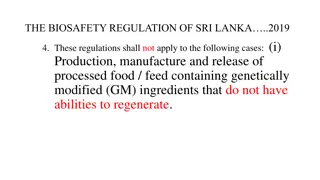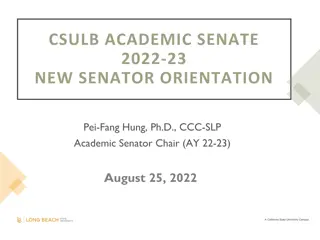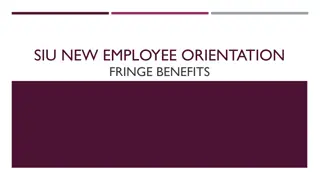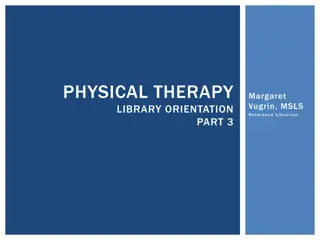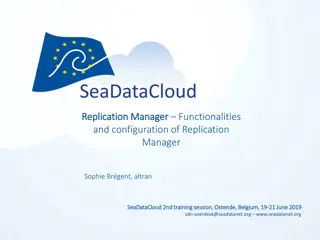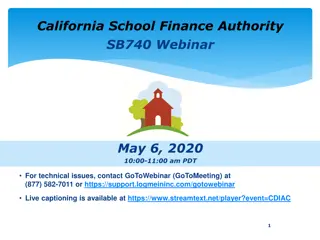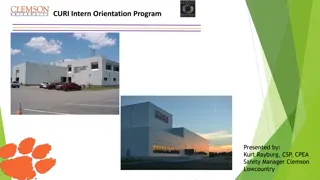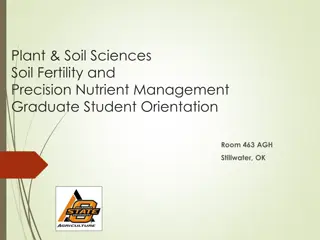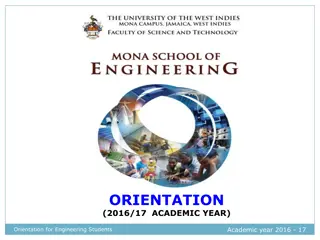New Program Manager Orientation - Key Topics and Regulations
This introductory orientation presentation for new program managers in BHS Quality Assurance covers essential topics such as federal and state regulations, documentation requirements, staff needs, quality improvement programs, beneficiary satisfaction, confidentiality, and grievance procedures. It also highlights key leadership figures in San Diego County's Mental Health Services Agency. Gain a comprehensive overview to navigate the program management landscape effectively.
Download Presentation

Please find below an Image/Link to download the presentation.
The content on the website is provided AS IS for your information and personal use only. It may not be sold, licensed, or shared on other websites without obtaining consent from the author.If you encounter any issues during the download, it is possible that the publisher has removed the file from their server.
You are allowed to download the files provided on this website for personal or commercial use, subject to the condition that they are used lawfully. All files are the property of their respective owners.
The content on the website is provided AS IS for your information and personal use only. It may not be sold, licensed, or shared on other websites without obtaining consent from the author.
E N D
Presentation Transcript
NEW PROGRAM MANAGER ORIENTATION BHS Quality Assurance
WELCOME TO AN INTRODUCTORY ORIENTATION FOR NEW PROGRAM MANAGERS This presentation offers a brief overview of several important topics related to program management and quality improvement in the County of San Diego s Mental Health Plan (MHP). It is an orientation and does not take the place of the various provider manuals that will be discussed.
TOPICS COVERED This orientation will cover the following topics: Federal and State statutes and regulations Documentation Requirements and Uniform Clinical Records Staff Requirements Highlights from the Organizational Provider Operations Handbook (OPOH) Quality Improvement Programs Beneficiary Satisfaction Surveys Confidentiality Beneficiary Grievances and Rights
FEDERAL AND STATE REGULATIONS REGULATIONS TO BE FAMILIAR WITH Requirements for the following Federal and State regulations, as well as County policies and procedures, are an integral part of a program manager s knowledge base. Federal Managed Care Regulations Title 9, California Code of Regulations, Chapter 11 California Welfare & Institutions Code (W&IC) California's Medicaid State Plan (Title XIX) California State Plan Amendment - Number 10- 012B (SPA) Mental Health Services Act (MHSA) The Civil Code of the State of California (CIV) Code of Federal Regulations, Title 42 (42 CFR) California Health and Safety Code (HSC) Health Information Portability and Accountability Act (HIPAA) California Education Code (EDC) Title VI, Civil Rights Act of 1964 Business and Professions Code (BPC)
COUNTY POLICIES AND PROCEDURES The County of San Diego Health and Human Services Agency (HHSA) is the broader agency that includes Behavioral Health Services. All County and County Contract program managers should be familiar with the following policies and procedures. Agency Compliance Office (ACO) policies and procedures HHSA Code of Conduct Outpatient Program Operations Handbook (OPOH) Uniform Clinical Record Manual (UCRM)
SAN DIEGO COUNTY MENTAL HEALTH SERVICES LEADERSHIP San Diego County ( The County) Chief Administrative Officer (CAO) is Helen N. Robbins-Meyer Assistant CAO/Chief Operating Officer (COO) is Donald F. Steuer Health and Human Services Agency (HHSA) HHSA Agency Director is Nick Macchione, MS, MPH, FACHE Within HHSA is Luke Bergmann, Ph.D. Director of Behavioral Health Services
WHAT ELSE DO YOU NEED TO KNOW? Resources: One of the best places to find information about what is required is your contract. Your program s assigned Contracting Officer s Representative (COR) BHS Outpatient Program Operations Handbook (OPOH) QI Matters email at QIMatters.HHSA@sdcounty.ca.gov Optum San Diego at Optum Website MHP Provider Documents
COMMON ABBREVIATIONS AOA Adult and Older Adult CYF Children Youth and Families EPSDT Early Periodic Screening Diagnosis and Treatment EPU - Emergency Psychiatric Unit (Adults and Older Adults) ESU - Emergency Screening Unit (Children and Adolescents) MHP - Mental Health Plan MHSA - Mental Health Services Act QA - Quality Assurance SDCBHS - San Diego County Behavioral Health Services SDCPH - San Diego County Psychiatric Hospital SIR - Serious Incident Report SMHS - Specialty Mental Health Services SOC System of Care SUD - Substance Use Disorders Services
TARGET POPULATIONS CHILDREN, YOUTH, FAMILIES, ADULTS AND OLDER ADULTS
TARGET POPULATION WHO DO WE SERVE? Persons with Medi-Cal Persons with no insurance Low Income Individuals who may have other 3rd party insurance such as Medicare Through the California Advancing and Innovating Medi- Cal (CalAIM) Initiative and Assembly Bill (AB) 133 access criteria has expanded for eligible beneficiaries
CALIFORNIA ADVANCING AND INNOVATING MEDI-CAL INITIATIVE CalAIM is a significant transformation designed to reform several aspects of the California Medi-Cal system including Documentation Access to Services Service Delivery and Coordination of Care Payment Reform No Wrong Door Policy
WHERE TO FIND INFORMATION Updates to are sent out through California Department of Health Care Services (DHCS) Letters and Informational Notices which can be found on the DHCS website. DHCS Informational Notices CalAIM Managed Care All Plan Letters You can also refer to the San Diego County of Memo that was published on 8.15.2022 BHS Contractor Memo-CalAIM Documentation Reform (pdf) (optumsandiego.com)
WHERE TO FIND INFORMATION BEHAVIORAL HEALTH INFORMATION NOTICE (BHIN) 22-019 Outlines Requirements for: Standardized Assessment Requirements SMHS, DMC, and DMC-ODS Problem List SMHS, DMC and DMC-ODS Progress Notes Treatment and Care Planning Requirements Telehealth Consent
SECTION D OF THE OPOH COUNTY SPECIFIC GUIDELINES 07 OPOH Section D Providing Specialty Mental Health Services (pdf) (optumsandiego.com)
ACCESS CRITERIA FOR UNDER 21 PLEASE REFER TO (BHIN) NO: 21-073 DHCS IS STILL DEVELOPING TRAUMA SCREENING TOOLS
ACCESS CRITERIA FOR OVER 21 PLEASE REFER TO (BHIN) NO: 21-073
UTILIZATION REVIEW PROCESS Mental Health Services has developed standards for Utilization Review and/or Utilization Management(UR/UM). The processes vary for: Adults and Older Adults System Children, Youth and Families Program Managers are responsible for ensuring that their programs are following the UR/UM Standards. Please check with your COR to ensure you have the latest information or refer to the Organizational Provider Operations Handbook (OPOH) Section D.
DOCUMENTATION STANDARDS
LEARNING ABOUT DOCUMENTATION STANDARDS Familiarity with Documentation Standards is a critical function of all Program Managers as services are billed to the State and federal government. All documentation must adhere to minimum standards to reduce the risk of compliance issues. Services must document how the intervention or service will address the person in care s identified behavioral health need alongside meeting criteria for continued access to services. Where do new program managers and clinical staff turn for information on documentation? Uniform Clinical Record Manual, QA Documentation Trainings, and the CalMHSA Documentation Guides/Trainings
THE UNIFORM CLINICAL RECORD MANUAL (UCRM) This manual is the complete guide to documentation in the County of San Diego mental health system. It is the resource for information on forms, documentation timelines and documentation standards. Only forms from the manual (or those created by QA) should be used. Exceptions to the Manual must be approved by the QA Unit. The Uniform Clinical Record Manual can be found on the Optum San Diego website (click on the UCRM tab)
DOCUMENTATION TRAINING There are multiple documentation training opportunities offered by QA and Optum: Audit Leads Learn how County QA conducts MRRs (For PMs and QA staff). Mental Health Progress Notes Practicum Real-time practice writing progress notes with County QA feedback and support (For all direct service staff). Root Cause Analysis (RCA) documentation tool for systems analysis following a death/incident. (For PMs and program QI staff) Documentation Webinars and tutorials available on the Optum San Diego website. (click on the Training tab) NOABD and Service Indicators
STAFF REQUIREMENTS In order for staff to provide services, several criteria must be met: Clinical Staff must have an NPI (National Provider Identifier ) number. The NPI is a unique identification number for covered health care providers. The NPI is a HIPAA requirement
STAFF REQUIREMENTS For questions on how to obtain an NPI, you can: Phone: 1-800-465-3203 or TTY 1-800-692-2326 E-mail: customerservice@npienumerator.com Mail: NPI Enumerator P.O. Box 6059 Fargo, ND 58108-6059
STAFF REQUIREMENTS CalMHSA Trainings for MHP for CalAIM All clinical staff registered in CCBH are required to complete the trainings as well as supervisors and managers of clinical registered CCBH users. Registered clinical users are required to complete the following CalMHSA trainings: o CalAIM Overview o Screening o Assessment o Transition of Care Tool o Diagnosis & Problem List o Progress Notes o Discharge Planning o Access to Service o Care Coordination New staff shall complete required training no later than 90 days from hire date. Programs are responsible for ensuring staff complete required trainings. For more information, see the CalAIM for BHS Providers page on the Optum site. Reminder: Please ensure you are checking the most recent documentation manuals on the CalMHSA website as they are updated to ensure that the most recent information is included.
STAFF REQUIREMENTS CalMHSA Documentation Trainings CalMHSA has been collaborating with DHCS on the integration of CalAIM requirements and documentation standards. Part of their process has been to create training guides and videos to support counties in implementation of updated documentation standards. The County is asking that staff listed below review the documentation guidelines, which can be found here: California Mental Health Services Authority | CalAIM (calmhsa.org). The following are additional items that can be found on the CalMHSA website geared to support providers with the roll out of the CalAIM initiative: CalAIM Communication Materials Communication Materials for Staff Communication Materials for People in Care Communication Materials for People in Care (Spanish)
STAFF REQUIREMENTS CalMHSA Documentation Trainings (continued) CalAIM Documentation Guides, Web-Based Trainings & Training Dashboard Documentation Guides MH Clinical Staff MH Certified Peer Support Specialists MH MHRS & Other Staff MH Medical Staff SUD Clinical Staff SUD Certified Peer Support Specialists SUD AOD Counselors SUD Medical Staff Training Dashboard Option to Download data (into an Excel spreadsheet) at the bottom of the webpage
STAFF REQUIREMENTS CalMHSA Documentation Trainings (continued) CalAIM Policies & Procedures and Attestations P&P Attestation for BHINs 21-071, 21-073 & 21-075 P&P Attestation for BHIN 22-011 No Wrong Door P&P Attestation for BHIN 22-019 Documentation requirements for all SMHS, DMC, and DMC- ODS Services Medical Necessity Determination and Level of Care Determination Requirements for Drug Medi-Cal (DMC) Treatment Program Services (BHIN 21-071) Criteria for Beneficiary Access to SMHS, Medical Necessity and Other Coverage Requirements (BHIN 21-073) Drug Medi-Cal Organized Delivery System Requirements for the period of 2022-2026 (BHIN 21-075) Documentation Requirements for all SMHS (BHIN 22-019) No Wrong Door (BHIN 22-011)
STAFF REQUIREMENTS Requirements for Programs that May Serve Clients with Medicare Programs are required to have approved Medicare Provider Numbers known as PTAN for Psychiatrist, LCSW, Licensed Psychologist and Nurse Practitioners Programs must have Medicare eligible providers to provide services CMS 855 I and CMS 855R are required to be completed and submitted to the Medicare Intermediary Noridian There are specific documentation requirements for Medicare
STAFF REQUIREMENTS Staff must also have access to the County s Management Information System (MIS), which is called CCBH and must also have a CCBH Staff ID To gain access to CCBH, staff must: Submit an ARF (Access Request Form) by the program manager and send it to the MIS unit to receive staff CCBH ID and CCBH Password (Program Managers are also responsible to notify the MIS unit when staff terminates, so they no longer have access to CCBH.)
STAFF REQUIREMENTS Staff are required to attend EHR training sessions as they apply to their job function: For example, clinical staff will learn how to enter Behavioral Health Assessments (BHAs), Client Plans and Progress Notes into CCBH Trainings are provided through Optum San Diego You can register staff through their Training Page, and it provides helpful information on pre-training and post-training material CCBH Training (optumsandiego.com)
STAFF REQUIREMENTS Clinical staff that can provide mental health services: 1. 2. 3. 4. 5. 6. 7. 8. 9. Physician Licensed Psychologist (or licensed waivered Psychologist) Licensed Clinical Social Worker (or registered ASW) Licensed Marriage and Family Therapist (or registered AMFT) Licensed Professional Clinical Counselor (or registered APCC) Master s level student interns (Trainees) Registered Nurse Mental Health Rehabilitation Specialist (MHRS) Para-professionals It is a Program Manager s responsibility to ensure that all staff are licensed, registered or waivered and/or receive appropriate co- signature on documentation.
STAFF NEEDING A WAIVER Each CA licensed psychologist candidate and/or LCSWs or LMFTs from out of state must obtain a license waiver. Psychologists are waivered for 5 years Out of state Waivers are only effective for 3 years
IMPORTANT STAFF INFORMATION LCSW and LMFT candidates must remain registered with his/her licensing board until such time the candidate is licensed. For LCSW/LMFT candidates, no waiver is needed, nor can one be obtained; the only exception pertains to license-ready candidates recruited from out of state. Masters level student interns (Trainees) may provide mental health services as long as they receive appropriate supervision and have their work co-signed based on requirements found in the Uniform Clinical Record Manual (UCRM)
STAFF REQUIREMENTS Credentialing and Recredentialing All Direct Service Staff who participate in San Diego County Behavioral Health Plan (SDCBHP) must be credentialed/re-credentialed according to SDCBHP requirements. Discuss the credentialing process with your legal entity to obtain more information on the specific requirements.
STAFF REQUIREMENTS Credentialing and Recredentialing Initial Credentialing: Complete Optum s on-line application by calling the Behavioral Services Credentialing Department at (800) 482-7114 or by sending a notification email to BHSCredentialing@optum.com Re-credentialing: Individual practitioners and Residential Programs Sites undergo recredentialing every three (3) years. Re-credentialing will begin approximately six (6) months prior to the expiration of the credentialing cycle.
MEG REGS/NETWORK ADEQUACY: SYSTEM OF CARE APPLICATION As part of Network Adequacy Requirements ( BHIN 22-032 and 22-033) providers have been asked to utilize the System of Care (SOC) application to collect the information needed to assist with County routine submission Program Managers and Providers are required to attest to all SOC information monthly New staff and transfers are required to register promptly and attest to information once registration is complete. For tips, FAQs, and additional information SOC Tips and Resources (optumsandiego.com) or email sdhelpdesk@optum.com
A MUST READ FOR NEW PROGRAM MANAGERS Organizational Provider Operations Handbook (OPOH) The current Version is found on the OPTUM San Diego Website OPOH Organizational Providers Operation Handbook (pdf) (optumsandiego.com)
OPOH HIGHLIGHTS This is a guide for all program managers with information needed for running your program. It contains specific requirements for a program. This handbook provides references and referrals for further assistance. Each chapter will provide you with valuable information so, let s get started.
OPOH HIGHLIGHTS Chapters in the Handbook: Systems of Care Compliance and Confidentiality Accessing Services Providing Specialty Mental Health Services Integration with Physical Health Care Beneficiary Rights, Grievance and Appeals Quality Management Program Cultural Competence Management Information System Provider Contracting
OPOH HIGHLIGHTS Chapters in the Handbook (continued): Provider Issue Resolution Practice Guidelines Staff Qualifications and Supervision Data Requirements Training Mental Health Services Act MHSA Payment Schedule and Budget Guidelines for Cost Reimbursement Quick Reference Guide List of Appendices
THE (OPOH) DETAILS IMPORTANT QA REQUIREMENTS Internal Quality Improvement Controls and Activities Medical Record Requirements Quality Management & Short-Doyle Medi-Cal Requirements Staff Signature Logs Medi-Cal Recoupment and Appeals Process Medi-Cal Site Reviews Medication Monitoring Process Accessibility of Services/Wait Times Client and Performance Outcomes Reporting Serious Incidents Provider transfer request
FINANCIAL MANUAL Each program is responsible to have a copy of the Financial Eligibility and Billing Procedures Organizational Providers Manual It provides detailed instructions for completion of financial eligibility and billing processes including entry of third-party coverage and financial reviews (UMDAP), billing and recording of payments. The manual is available on the Optum website: Financial Eligibility and Billing Manual (pdf) (optumsandiego.com)
MEDICAL RECORD Programs are required to use the CCBH EHR or current forms found in the Uniform Clinical Record Manual as needed. Medical Records are a hybrid chart, as some documentation will be maintained in a paper chart. All records must be maintained in a secure location, filed in a prescribed order, and be retrievable for audits by QM, DHCS or other entities
QUALITY MANAGEMENT & SHORT- DOYLE MEDI-CAL REQUIREMENTS Programs will be monitored for quality and compliance by the BHS Quality Assurance Unit. Medical Record Reviews occur annually Medication Monitoring occurs quarterly Medi-Cal site certifications occur initially and every three years for site re-certification The QA unit monitors trends and/or patterns that may result in quality improvement recommendations
STAFF SIGNATURE LOGS A Signature Log is a list of all current staff providing direct services, their licensure, job title, and a copy of their typical signature. All organizational providers are required to maintain an accurate and current staff signature log. Logs must reflect any changes in staff licensure, degree, job title, name, or signature. Logs shall be made available at request of QM or DHCS during reviews, visits, etc.
MEDI-CAL RECOUPMENT AND APPEALS PROCESS Billings will be disallowed that do not meet documentation standards in the Uniform Clinical Record Manual. Per the current California State DHCS Reasons for Recoupment of FFP Dollars, MHP is obligated to disallow Medi-Cal claims under: Related to Fraud, Waste, and Abuse Medical necessity Progress notes
MEDI-CAL RECOUPMENT AND APPEALS PROCESS Progress Note Disallowances: No Progress Note or no narrative for a service claimed Time billed for the service is greater than the time documented Billing service time for a No Show when no service was provided No SMHS was provided - Service provided was solely academic, vocational, recreation, socialization or supportive service only. The service was not provided within the scope of practice of the person delivering the service. Progress note was not signed (or electronic equivalent) by the person(s) providing the service Service provided were ineligible for FFP (Federal Financial Participation) or in setting subject to lockouts (i.e. service provided while client was in an IMD, Jail, Juvenile Hall, etc.)
MEDI-CAL RECOUPMENT: PROGRESS NOTE DISALLOWANCES
